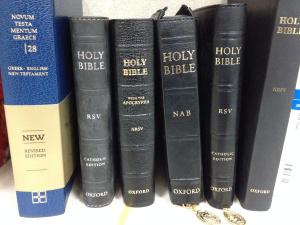Working with Bibles can be a heady experience. I mean, the sheer numbers are staggering. A whole herd of cattle must be slain annually just to manufacture the covers for all the Scofield Bibles in the world. What is it about literalists that demands animal sacrifice to read the words of the Prince of Peace? Bibles, Bibles everywhere, and not a word to read! According to statisticbrain.com, there are over 6,001,500,000 Bibles in print. That’s closing in on a parity with the world population, only one billion to go. There are websites dedicated to selling only Bibles. Nearly any bookstore will have at least a shelf full of them. I even ran across the website of an enterprising individual who seems to have figured out that there’s a market for taking Gideon Bibles from hotel rooms and selling them online. The Bible business, in the words of Big Dan Teague, “is not a complicated one.” And every year more are printed. Full-text versions are freely available online at any number of sites, and still more can be sold.

I often ponder the western love affair with the Bible. My entire career, with all its ups and downs, has been fashioned from an early intrigue with holy writ. In the beginning was the Bible. And culture followed in the footsteps of holy scripture. It’s not difficult to see why. Even further back than ancient Palestine, people worried about dying. Consciousness is funny that way—it has trouble conceiving of the world without itself. The Bible, for many centuries, offered the accepted solution to the death equation. You may have to die, but you don’t have to stay dead. Today we think of zombies as those refusing to remain lifeless. The Bible begs to differ, unless, of course, you’re reading the Zombie Bible. And still the presses roll on.
Considering the profit to be turned by selling Bibles, I wonder that more don’t show the cynicism of Big Dan. Is no one suspicious that printing the Good Book is called an industry? What other book, so freely given away, can sustain such a massive global market? I have to plead guilty myself to having a least a dozen different Bibles within easy reach every day. They even have their own separate labels at Barnes and Noble. So as I sit down planning on how to grow this ever-expanding market even more, I think of the many other industries that rely on mine. We have spun off worlds that orbit around the Bible. It is, despite the many nay-sayers, the cornerstone of modern Western civilization. If a tree falls in the woods, a Bible may be printed from it. Which of the 57 varieties do you take with your daily bread?
